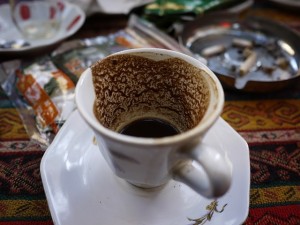to try and predict the future, to read the tea leaves
[verb]
[kof-fie-dik kijk-ken]
[keek koffiedik, koffiedik gekeken] ![]()
 ‘Koffiedik kijken’ is a form of ‘tasseography‘: fortune-telling based on the interpretation of patterns in coffee grounds. The practice of ‘koffiedik kijken’ is not common in the Netherlands. The expression however is 🙂
‘Koffiedik kijken’ is a form of ‘tasseography‘: fortune-telling based on the interpretation of patterns in coffee grounds. The practice of ‘koffiedik kijken’ is not common in the Netherlands. The expression however is 🙂
‘Het/dat is koffiedik kijken’ is also often used in the meaning of “that’s hard to say”, “that’s difficult to predict” or ‘who knows?’
Examples:
– “Wanneer denkt u de verbouwing van het museum is afgerond?” – “Tja, dat is een beetje koffiedik kijken; er zijn heel veel factoren die van tevoren lastig in te schatten zijn.”
(“When do you think the renovation of the museum will be finished?” – “Well, there are many factors involved, all of which are difficult to assess up front, so it’s difficult to say really.”)
– “Ik wil graag een weekendje naar Amsterdam in het najaar. Wanneer kan ik het beste gaan?” – “Jeetje, nou, dat is koffiedik kijken hoor; het weer is dan heel wisselvallig!”
(“I would really like to go to Amsterdam for a weekend in (the) autumn. When is best to go?” – “Gee, well, that’s hard to say; the weather is very unstable in that time of the year.” In Dutch ‘het najaar’ can be used as a synonym for ‘herfst’: autumn. However in daily use it may extend until the end of the year.)
– “Wat kan ik zeggen, ik kan geen koffiedik kijken!” – “Nee, dat snap ik, maar je kunt toch wel een inschatting maken?”
(“What can I say, I can’t predict the future!” – “No, that I understand, however you can make an educated guess, can you not?”)
– “Hoe zal het nu aflopen met de crisis in Europa?” – “Jongen, daar heb ik een kort antwoord op: het is koffiedik kijken! Zo, nog een biertje?”
(“How will it (all) end with the crisis in Europe?” – “Mate/man, I have a short answer to that: who knows?! There, another beer?”)
Expressions:
– “Een vooruitziende blik hebben”: to have a foresight/vision.
Related words:
– Toekomst: future [noun] [de toekomst, <no plural>].
– Voorspellen: to predict [verb] [voorspelde, voorspeld].
Example:
– “Als we alles zouden kunnen voorspellen dan zou het leven een stuk makkelijker zijn. Of juist niet, het is maar hoe je het bekijkt!”
(“If we were able to predict everything, then life would be a lot easier. Or not at all, it all depends on how you look at things!”)
– Waarzegster: fortune-teller [noun] [de waarzegster, de waarzegsters]. For some reason the default gender for a fortune-teller in Dutch is female. The male version would be ‘waarzegger’ but you don’t hear that often.
– Voorgevoel: premonition [noun] [het voorgevoel, de voorgevoelens].
– Inschatten: to assess, to judge, to make an educated guess [verb] [schatte in, ingeschat].
